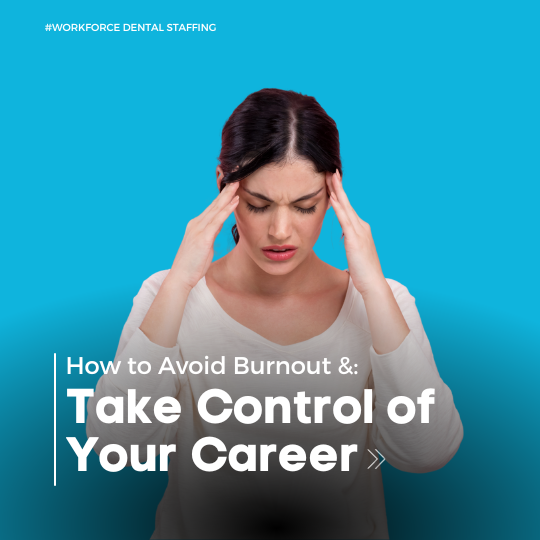Why Are Dental Hygienists Burnt Out?
If you’re a dental hygienist, there’s a good chance you’re burnt out. Every day is a chore, your job feels unfulfilling, and horror fills your eyes as you down your morning cup of coffee and the clock inches towards clock-in time.
It’s a common problem: according to a recent survey by the American Dental Hygienists’ Association, 22% of dental hygienists frequently feel burnt out. That number crosses the 30% threshold for professionals under the age of 45.
The reasons for this increasing trend are plentiful. Hygienists who manage more than 10 patients per day are significantly more likely to feel stressed about their work, which makes sense considering that 50% of professionals believe they don’t have enough time per appointment with an individual patient.
In addition, dental hygienists frequently feel underpaid and undervalued, both by patients and other members of their office. Those trends have worsened since the onset of the COVID-19 pandemic, which has led to a backlog of patients that resulted in more frustrations on everyone’s behalf. As a result, 8% of dental hygienists have left the industry since the pandemic began in early 2020.
3 Ways to Beat Burnout as a Dental Hygienist
Fortunately, burnout doesn’t have to be the endpoint of a career in dental hygiene. With the right steps taken, especially hygienists who have chosen this field out of a desire to help their patients can combat the issue and create a better, less stressful environment for themselves.
1. Find a Work Solution that Provides Flexibility and Freedom
Much of the stress connected to the dental industry comes from a confined office environment in which a near constant backlog of patients and potentially toxic coworkers make it near impossible to escape. Fortunately, that scenario is far from the only possibility for dental hygienists looking for a better professional situation.
The alternative: a more flexible environment that allows the hygienist to jump between dental practices depending on need. This environment provides significantly more freedom, allowing professionals to choose when, where, and how much they’d like to work. Don’t like a particular practice? Just exclude it from your list of possibilities in the future.
2. Take Sufficient Time For Yourself
Work-life balance has been a consistent topic across industries since the onset of the pandemic, and dentistry is no different. Much of the burnout comes from long hours worked to account for the backlog caused by office closures. Taking time for yourself is a crucial step to rebuilding that work-life balance.
That might mean working part-time, especially when the personal situation demands it. It could also mean setting clear boundaries about evening or weekend hours. The goal is to ensure that at the end of a workday and workweek, you have enough time to spend with your family or on personal interests and recharge before working with patients again.
3. Understand the Power You Have
Many hygienists feel trapped in their profession and practice, but a broader look at the industry shows that this doesn’t need to be the case. Recent reports show clear evidence of a dental hygienist shortage:
- Nearly 40% of dentists are actively trying to recruit new hygienists
- 95% of those looking to hire hygienists say it’s been extremely or very difficult to hire someone.
- As a result, only half of hygienist positions are currently reported as filled.
Those numbers, in turn, signify a significant shift in power. Dentists need hygienists, and that leverage allows you to negotiate or re-think the way you approach your career. If your office environment has you feeling burnt out, quitting becomes a safer choice knowing that there are other (and more flexible) options available.
Creating Better Balance in a High-Stress Environment
As with any medical field, the dental hygiene profession is almost inherently stressful. When external factors add to that stress, it can become unsustainable for long-term professional happiness and well-being. Fortunately, plenty of options exist to help alleviate feelings of burnout.
Among them: Workforce, a dental staffing solution that puts the power in your hands. Work on your terms, match your schedule, and find and accept jobs directly on an app. You can even view and apply for permanent positions if you’re ready for that security. Ready to get started? Sign up to test it out today.

